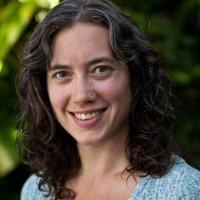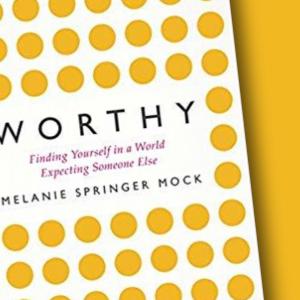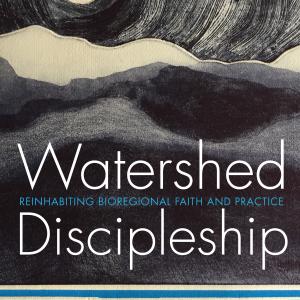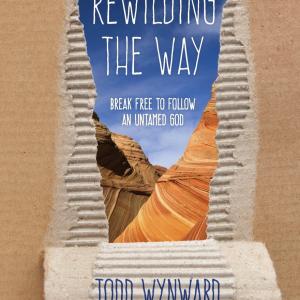
Cherice Bock teaches courses at Portland Seminary, is on the faculty of the Oregon Extension, and is a Ph.D. candidate in environmental studies at Antioch University New England.
Posts By This Author
Claiming Our True Value
WHEN MELANIE MOCK, author of the new book Worthy: Finding Yourself in a World Expecting Someone Else, realized as a teen that her newly acquired designer jeans would not lead her to immediate popularity, she bumped into questions I’m sure many of us face: Where does our worth come from? How do we get to the point where we truly believe we are worthy and beloved just as we are, as the children of God? Through sometimes humorous, sometimes heartrending, and always poignantly honest stories from her own experience, Mock opens the vulnerable space within to attend to the stories we tell ourselves about our value.
Mock’s stories point out the hidden messages about worthiness given to us by American culture, in particular the evangelical subculture, contrasting the messages of the “purity culture” with the biblical promises of our innate belovedness. She builds on the groundwork laid in If Eve Only Knew: Freeing Yourself from Biblical Womanhood and Becoming All God Meant for You to Be (Chalice Press), which she co-wrote with Kendra Weddle Irons.
While she focuses primarily on the messages given to white evangelical women, since this is her experience, she recognizes her privilege, as well as the parallels between the unhealthy and often impossible implicit standards American evangelicals hold for women, people of color, and LGBTQ+ folks, all who do not meet a white male “norm.” Mock addresses how evangelical cultures tend to create double standards for women, requiring a type of “purity” that has nothing to do with Christianity. She shares honestly about the fear that even when she seems to be fitting the mold of the ideal Christian woman, at any moment the façade of the successful mother/wife/professor will be unmasked.
Living Water
IF YOU'RE LIKE ME, you care about creation, but have a looming gap between your concern and knowing what to do about it. It can be paralyzing to live in an age of global climate change, environmental degradation, pollution, habitat loss, ocean acidification, lead in the drinking water of cities, and the melting of polar ice caps. Many works of ecotheology explain why caring for creation is a Christian imperative but struggle to get to the how.
Enter Watershed Discipleship: Reinhabiting Bioregional Faith and Practice. We can’t easily fathom a plan to care for the entire planet, but we can envision our watershed—the area in which water flows down to a common waterway such as a creek or river. (To find your watershed, enter your zip code on the EPA’s “Surf Your Watershed” site, epa.gov/surf.) Imagine caring for your watershed, along with the network of people who also live there. Ched Myers quotes Wendell Berry’s rewording of the Golden Rule to explain how this is an act of care for the entire planet: “Do unto those downstream as you would have those upstream do unto you.”
In the introduction, activist theologian Myers defines the phrase “watershed discipleship” as a “triple entendre.” It reflects “ a watershed historical moment of crisis, which demands that environmental and social justice and sustainability be integral to everything we do as Christians.” It recognizes a “ a watershed context”—that we follow Jesus in a “bioregional locus.” And “it implies that we need to be disciples of our watersheds”—in other words, “learning from, following, and coming to trust ... ‘The Book of Creation.’”
A Walk on the Wild Side
REMEMBER THE thrill that went through you when C.S. Lewis told you Aslan is not a tame lion? I sometimes forget about this untamed image of God when ensconced in my “safe” Christian community.
In his recent book Rewilding the Way: Break Free to Follow an Untamed God, Mennonite minister and permaculture practitioner Todd Wynward reminds us of the importance of the wilderness in the Bible and in Christian history. Wynward calls his book an “unapologetic rallying cry to rewild a Christianity that has become terribly tame.”
He argues for a third way of enacting discipleship: not the radical renunciation of ascetics, open only to the childless and unattached, nor a life of unexamined affluence, but a life of spiritual resilience where we develop strong, place-based communities of praxis who care for one another and creation through the power of the Holy Spirit. He invites us to remember the transformation that occurs through the wilderness testing of Moses and the Israelites, many of the prophets, John the Baptist, Jesus, the apostle Paul, and the desert fathers and mothers. In the wilderness we learn about “enough,” trusting God, and how much we need one another. We learn about our paradoxical smallness and value to our loving God.
A text like this could reinforce Christian contemplative navel-gazing and a personal experience of God as only available in the sublime elements of nature, unreachable in a sullied built environment. Wynward avoids this pitfall by focusing on community and a covenanted right relationship with God, others, and creation. He discusses environmental justice, activism, and urban projects that rewild spaces closer to home.


